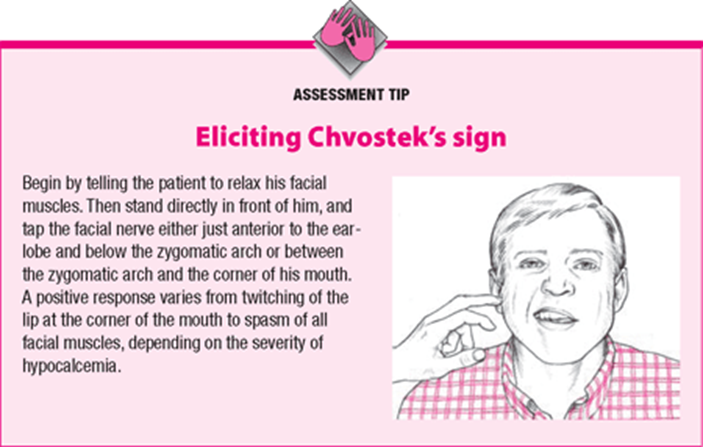A nurse is collecting the medical history from a client who has manifestations of syndrome of inappropriate antidiuretic hormone (SIADH). The nurse should ask the client if he has a history of which of the following conditions that can cause SIADH?
Lung cancer
Osteoarthritis
Dyspepsia
Liver cirrhosis
The Correct Answer is A
A. Certain malignancies, particularly lung cancer, can produce ectopic antidiuretic hormone (ADH) or ADH-like substances, leading to SIADH. It's important to inquire about a history of lung cancer due to its association with SIADH.
B. Osteoarthritis is a degenerative joint disease and is not known to cause SIADH.
C. Dyspepsia refers to upper gastrointestinal discomfort and is not associated with SIADH.
D. Liver cirrhosis can lead to various complications, including hepatic encephalopathy and ascites, but it is not typically associated with SIADH.
Nursing Test Bank
Naxlex Comprehensive Predictor Exams
Related Questions
Correct Answer is D
Explanation
A. Hyponatremia is characterized by low sodium levels in the blood and is not typically associated with crackles in the lungs or elevated blood pressure.
B. While hyperkalemia is a concern in end-stage kidney disease, it is not typically associated with crackles in the lungs or elevated blood pressure.
C. Hypovolemia, or low blood volume, is not consistent with the client's reported symptoms of swelling in the lower extremities and crackles in the lungs.
D. Hypervolemia, or fluid overload, is common in end-stage kidney disease and can manifest with symptoms such as shortness of breath, lower extremity edema, crackles in the lungs (due to pulmonary congestion), and elevated blood pressure.
Correct Answer is B
Explanation
A. Kernig's sign is a test for meningitis and is not related to the tingling sensation described by the client.
B. Chvostek's sign is a clinical sign of hypocalcemia, which can occur post-thyroidectomy due to inadvertent damage or removal of the parathyroid glands.
C. Babinski's sign is a test for upper motor neuron lesions and is not related to the tingling sensation described by the client.
D. Brudzinski's sign is a test for meningitis and is not related to the tingling sensation described by the client.

Whether you are a student looking to ace your exams or a practicing nurse seeking to enhance your expertise , our nursing education contents will empower you with the confidence and competence to make a difference in the lives of patients and become a respected leader in the healthcare field.
Visit Naxlex, invest in your future and unlock endless possibilities with our unparalleled nursing education contents today
Report Wrong Answer on the Current Question
Do you disagree with the answer? If yes, what is your expected answer? Explain.
Kindly be descriptive with the issue you are facing.
